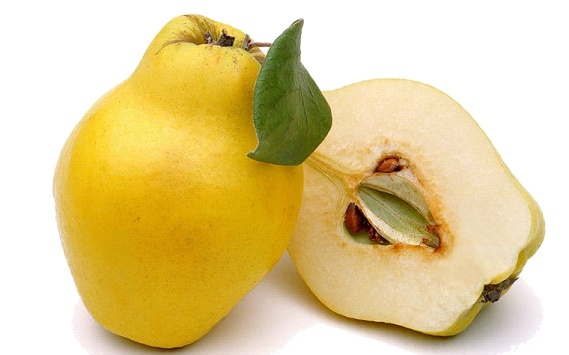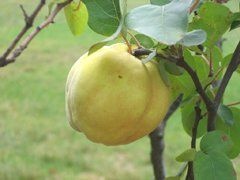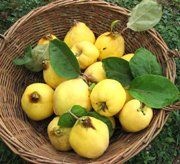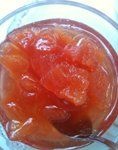Rasool Allah صلی اللہ علیہ وسلم's guidance about it:
Benefits of Safarjal (Quince) on Qalb, breathe, Chest &Heart: -
2. Hazrat Jabir Bin Abdullah رضي الله عنه says that Nabi صلی اللہ علیہ وسلم said "Eat Safarjal (السفرجل) (Quince) because it heals cardiac problems & removes heaviness from chest : Reference Kanz al-Ummal: 28258
3. Hazrat Anas Bin Malik رضي الله عنه says that Nabi صلی اللہ علیہ وسلم said "By eating Safarjal (السفرجل)(Quince), heaviness in Qalb (heart) reduces . : Reference Kanz al-Ummal: 28261
Best Time to eat Safarjal (Quince): -
5. Hazrat Anas Bin Malik رضي الله عنه says that Nabi صلی اللہ علیہ وسلم said, to eat Safarjal (السفرجل) early morning on empty stomach . : Reference Kanz al-Ummal: 28259.
Safarjal (Quince) in Pregnancy: -
6. Hazrat Abdullah Ibn Masood رضي الله عنه says Nabi صلی اللہ علیہ وسلم said, that "Give your pregnant to eat Safarjal (السفرجل) (Quince) & Hazrat Auf Bin Malik رضي الله عنه adds, it prevents Cardiac Problems ( يجم دالفوءا)& makes the baby son beautiful (ويحسن الولد ). : Reference Al-Aasaar: 70 (Abdul Ibn Masood) & Jamia ul Ahadees: 15779 (Auf Bin Malik)

Binomially, quince is the only fruiting tree in the genus: Cydonia. Scientific name: Cydonia oblo
Quinces are medium sized semi-tropical deciduous trees, growing to about 10 to 15 feet in height. Pink-white flowers appear during the late spring and early summer, which develop into golden color pear-shaped fruits. The fruit is larger than average apple and bumpy; appear somewhat like large guava, avocado, or as short-necked pear fruit. Its fuzzy surface is smooth as in peaches.
The quince fruit weighs about 250-750 g or more in some varieties. Inside, its flesh is light yellow, gritty and has several seeds at its center as in apples. Raw quince has intense fruity smell, and together with its bright yellow color instantly attracts the fruit lover’s attention. However, raw fruits, even after ripen, generally astringent and tart in taste.
Health benefits of quince fruit
-
Quince is low calorie fruit. 100 g fresh raw fruit provides 57 calories. It composes several vital poly-phenolic antioxidants higher concentration than apples and pears. The fruit actually is the storehouse of vital phyto-nutrients such as dietary fiber, minerals, and vitamins.
-
Quince pulp along with its peel holds good amounts of dietary fiber. Further, its gritty granules in the flesh compose of astringent compounds known as tannins, namelycatechin and epicatechin. These phytochemicals bind to cancer-causing toxins in the colon, protecting its mucousa from inflammatory bowel disease (IBD), cancers, and diverticulitis. In addition, tannins help reduce body weight and blood LDL cholesterol levels.
-
Quince has several phenolic compounds such as caffeoylquinic acid, procyanidin-B2, oligomeric procyanidin, polymeric procyanidin etc., and essential oils like furfural, limonene, linalol, vomifoliol, toluene, ß-ionone, a-terpineol, etc. Together, these compounds give quince its unique fragrance.
-
Ripe quince fruit carry good levels of vitamin-C. 100 g fruit provides 15 mg or 25% of RDAof vitamin-C. Vitamin-C helps remove harmful oxygen-free radicals from the body. It helps boost immunity, reduce viral episodes, and inflammatory conditions.
-
The fruit is a good source of minerals such as copper (130 µg or 14% of RDA), iron, potassium, and magnesium as well as B-complex vitamins such as thiamin, riboflavin, and pyridoxine (vitamin B-6).
-
Although not well documented, quince fruit like in pears, has anti-allergenic, and anti-inflammatory properties. The fruit as well its seed's extraction is suggested in the treatment of cystitis, atopic dermatitis, and recommended by health practitioners as a safe alternative in the preparation of food products for allergy suffs.

Preparation and Serving tips
Raw quince is extremely sour and astringent as it has rarely eaten uncooked. Its bitter taste and choking feeling in the mouth is due to certain chemicals in the fruit known as tannins. Cooking destroys these compounds while retaining fragrant rich essential oils and aliphatic compounds in the fruit. With the addition of sugar or honey, the fruit makes excellent flavorful sweet and savory recipes, jams, jellies, and preserves.
To prepare, just wash the fruit in cold water. Cut the fruit in quarters as you do in apples and pears. Remove central core, and seeds using paring knife. Cut In small chunks or wedges and add in the cooking.

2. Helps in bleeding, diabetes, injury, reduce inflammation.
Science & Hadees regarding Quince:-
Quince is said that to eat Quince on an empty stomach is good for the soul. Cold and dry, Quince is astringent to the stomach, and it checks excessive menstrual flow. A few seeds placed in water will, after a few minutes, form mucilage which is an excellent remedy for cough and sore throat, especially in the young. Quince is also excellent for pregnant woman, gladdening their heart. The holy Prophet صلی اللہ علیہ وسلم said, "Eat Quince, for it sweetens the heart. For ALLAH has sent no Prophet as HIS messenger without feeding him on the Quince of Paradise. For Quince increases the strength.
1. Quince soothes & strengthens the heart, prevents & heals cardiac problems, removes heaviness in chest, Qabl, Eat it on empty stomach early morning.
2. There are 6 Hadees in this lesson



